Ron Kovic's biography about his service in Vietnam and his anti-war activism inspired the Tom Cruise film Born on the Fourth of July.
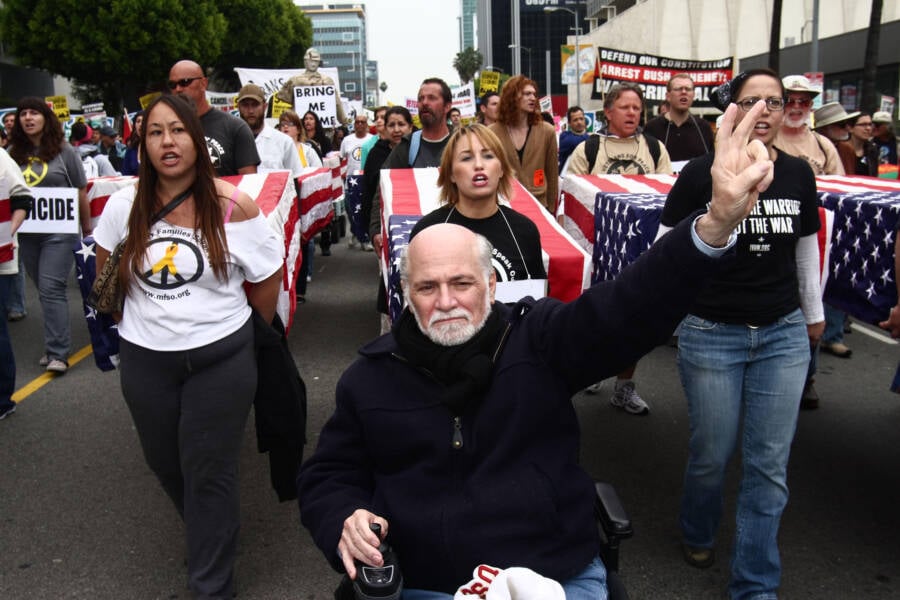
Chris Lee / ZUMA Press / Alamy Stock PhotoRon Kovic leading a large anti-war protest down the streets of Hollywood in March 2009 on the sixth anniversary of the invasion of Iraq by U.S. forces.
Lying in the dirt in the midst of a firefight and suffering from two bullet wounds — one of which collapsed a lung and injured his spinal cord, paralyzing him from the chest down — Ron Kovic was a dead man.
It was during the Vietnam War, a war he had volunteered for, that Kovic suffered his life-threatening — and life-changing — injuries. But after he was discharged from the hospital, Kovic took a staunchly different stance. He became a prominent anti-war activist, and he was arrested 12 times for political protesting by the time the conflict came to an end with the Fall of Saigon in 1975.
Kovic eventually recorded his story in a memoir titled Born on the Fourth of July in 1976, which was later adapted into a film starring Tom Cruise as Kovic in 1989. He continued protesting well into the George W. Bush administration, outspokenly critical of the presence of American forces in Iraq.
But how did Ron Kovic transform from a Marine hero into an anti-war activist?
Ron Kovic’s Pre-Vietnam War Years
Ronald Lawrence Kovic was born in Wisconsin on July 4, 1946. His parents met during World War II after each had enlisted in the U.S. Navy following the attack on Pearl Harbor in December 1941.
After the war, the two settled down in Wisconsin before moving their family to Massapequa on the south shore of Long Island. In school, Ron Kovic was an exceptional athlete. He showed great promise in wrestling and track, and for a time, he even considered a career in baseball.
But when he graduated in 1964, his life took a different path.
That September, he would follow in his parents’ footsteps and enlist in the U.S. Marine Corps. One year later, he was deployed to South Vietnam. Unfortunately, his experience during the war would leave a permanent mark.
Kovic’s First Tour In Vietnam
In December 1965, Kovic began a 13-month tour of duty in Vietnam. He had been inspired by John F. Kennedy’s speech — “Ask not what your country can do for you; ask what you can do for your country” — but found that inspiration wasn’t enough to eliminate the fear he felt when he first arrived in the war zone.
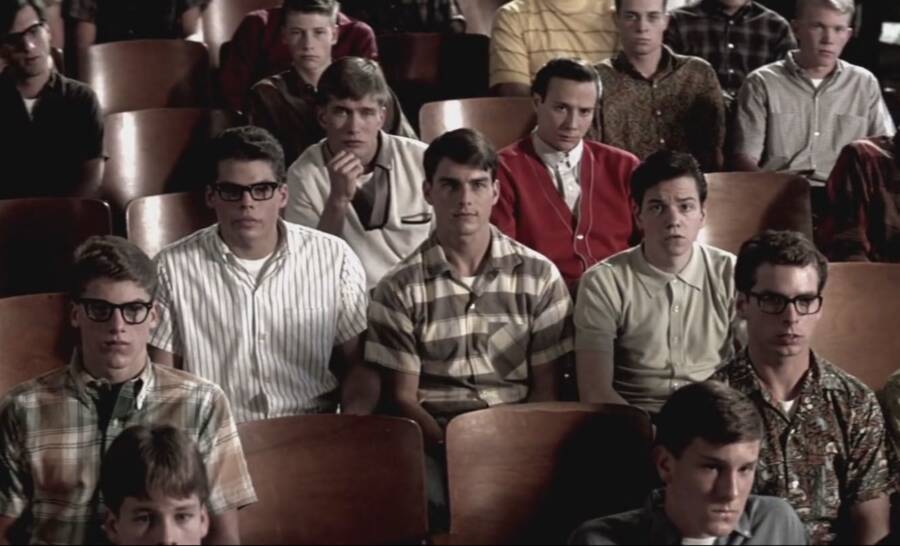
Universal PicturesTom Cruise as Ron Kovic in the film adaptation of Born on the Fourth of July (1989).
In the throes of chaotic combat during an ambush by a North Vietnamese Army unit in a village along the Cua Viet River, Kovic mistakenly fired his gun at a young U.S. corporal. When he attempted to confess to his superiors, they refused to hear it. For Kovic, this did nothing to set his mind at ease; his conscience was carrying a heavy burden.
Still, he believed that he was fighting the good fight. He held onto his conviction that stopping the spread of Communism in Vietnam was the right thing to do.
So, after his initial tour, Kovic volunteered to return to Vietnam. It was a decision that would haunt him for the rest of his life.
The Mission That Left Ron Kovic Paralyzed
During Kovic’s second tour, he got a taste of the true horrors of the Vietnam War. In one instance, during a night raid, he and his squad were given orders to fire into a small hut where they were told enemy soldiers were hiding. They followed their orders — only to discover that there had not been soldiers in the hut at all.
Instead, they saw women and children inside, some screaming, some dead.
And Kovic didn’t just suffer a mental toll from his second tour.
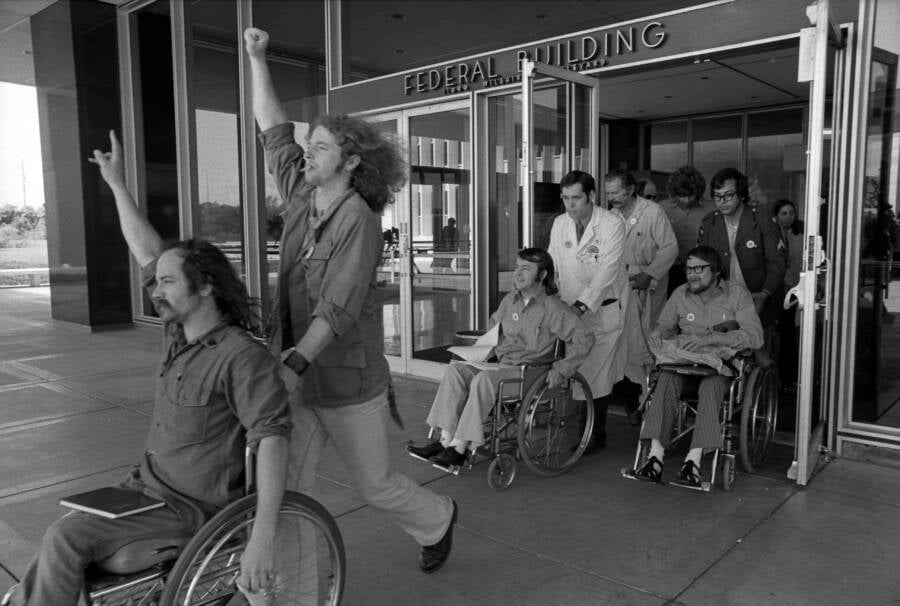
Wikimedia CommonsRon Kovic and other disabled veterans after a 17-day hunger strike in 1974.
On Jan. 20, 1968, Kovic was shot while leading a rifle squad on a reconnaissance mission. One bullet hit him in his right foot, and the second tore through his right shoulder. It passed through, collapsing one of his lungs and striking his spinal cord, rendering him paralyzed from the chest down.
“And finally I am dragged into a hole in the sand with the bottom of my body that can no longer feel, twisted and bent underneath me,” he wrote in Born on the Fourth of July. “Someone has just saved my life. My rifle is gone and I don’t feel like finding it or picking it up ever again. The only thing I can think of, the only thing that crosses my mind, is living.”
Following the incident, Kovic spent a week in an intensive care unit in Da Nang before returning to the U.S. for further treatment. He was awarded a Bronze Star and a Purple Heart for his service, but these awards meant little in comparison to what he had lost — his ability to walk.
Then, as Kovic wrote in a 2006 essay, he started to wonder “how our government could spend so much money (billions of dollars) on the most lethal, technologically advanced weaponry to kill and maim human beings but not be able to take care of its own wounded when they came home.”
‘Born On The Fourth Of July’ And Early Protests
Kovic’s own experience had taught him the real cost of war and solidified in him a conviction that the American government did not care for its soldiers. He became a public opponent of the war and the government’s treatment of veterans, frequently attending anti-war rallies and giving interviews on behalf of the non-profit Vietnam Veterans of America.
It was somewhat ironic, given that when he returned from his first tour, he’d had a completely different philosophy. In an interview with History Net in 2016, he said, “Resistance to the war offended me. I thought, here we are, risking our lives the way our fathers did in World War II, and these people are saying that we’re in the wrong.”
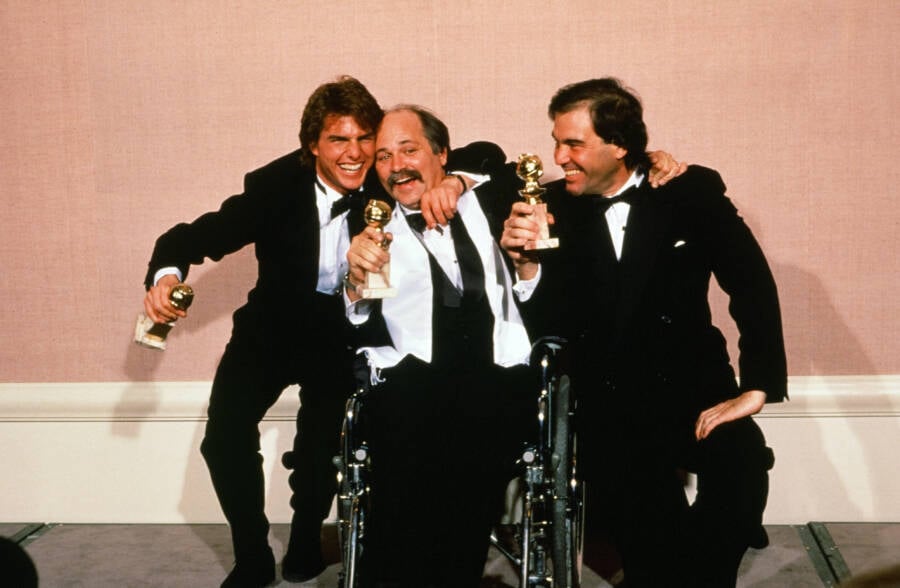
PictureLux / The Hollywood Archive / Alamy Stock PhotoThe film Born on the Fourth of July won a Golden Globe Award for Best Screenplay on Jan. 20, 1990 — 22 years to the day that Ron Kovic was paralyzed in Vietnam.
After returning from his second tour, Kovic would be arrested 12 times for protesting the Vietnam War. In 1972, at the Republican National Convention, Kovic spoke out during President Nixon’s acceptance speech, as reported by CNN, saying, “I’m a Vietnam veteran. I gave America my all, and the leaders of this government threw me and others away to rot in their VA hospitals. What’s happening in Vietnam is a crime against humanity.”
For some time, Kovic was the recipient of scornful glances and harsh criticisms, but upon the publication of his memoir — and later, the Tom Cruise-led film adaptation — more and more people started to connect with his message. (In fact, Kovic felt Cruise’s performance was so “heroic” that he gifted the actor his Bronze Star.)
And Kovic, with the spotlight now on him, continued to rally against America’s involvement in wars.
Protests Against George W. Bush’s War In Iraq
“It’s very difficult for me to conceive of a war I’d support,” Kovic said. “I am living with the emotional and physical consequences of war, and I don’t think that we try hard enough to avoid conflict.”
In the early 1990s, Kovic partook in several prominent anti-war demonstrations in protest of the Gulf War. At the end of that decade, he met with the Chinese ambassador to the U.S. in the wake of the U.S. bombing of the Chinese embassy in Yugoslavia. Kovic offered the ambassador two dozen red roses.
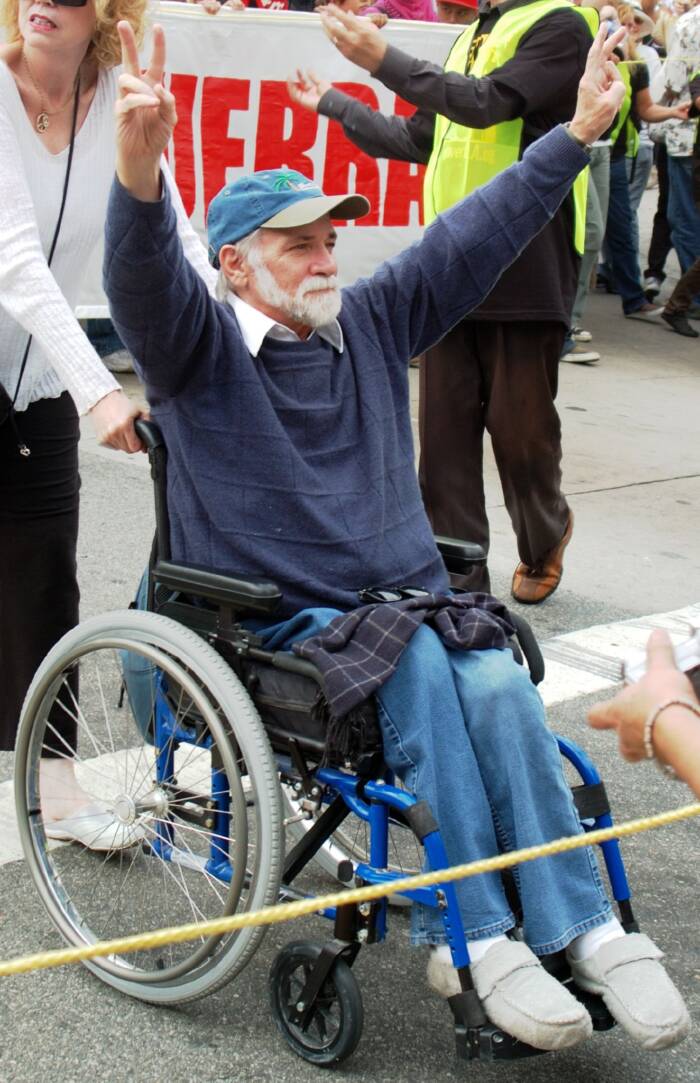
Wikimedia CommonsRon Kovic protesting at an anti-war rally in Los Angeles in October 2007.
Ron Kovic was likewise a strong opponent of George W. Bush’s war in Iraq, and he even led a massive protest in London’s Trafalgar Square in November 2003 against the then-U.S. president’s visit.
In March 2005, Kovic wrote a new introduction to Born on the Fourth of July:
“I wanted people to understand. I wanted to share with them as nakedly and openly and intimately as possible what I had gone through, what I had endured… I had been called a Communist and a traitor, simply for trying to tell the truth about what had happened in that war, but I refused to be intimidated.”
After learning about the life of Ron Kovic, read about Chuck Mawhinney, the deadliest sniper in Marine Corps history. Or, read the story of Roy Benavidez, the Vietnam veteran who survived “six hours in hell.”





